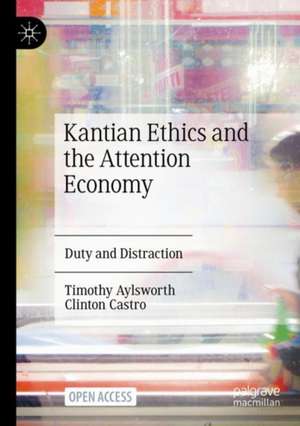Kantian Ethics and the Attention Economy: Duty and Distraction
Autor Timothy Aylsworth, Clinton Castroen Limba Engleză Paperback – 23 mar 2024
| Toate formatele și edițiile | Preț | Express |
|---|---|---|
| Paperback (1) | 351.49 lei 3-5 săpt. | |
| Springer International Publishing – 23 mar 2024 | 351.49 lei 3-5 săpt. | |
| Hardback (1) | 424.99 lei 6-8 săpt. | |
| Springer International Publishing – 22 feb 2024 | 424.99 lei 6-8 săpt. |
Preț: 351.49 lei
Nou
Puncte Express: 527
Preț estimativ în valută:
67.26€ • 70.37$ • 55.87£
67.26€ • 70.37$ • 55.87£
Carte disponibilă
Livrare economică 12-26 martie
Preluare comenzi: 021 569.72.76
Specificații
ISBN-13: 9783031456404
ISBN-10: 3031456408
Pagini: 275
Ilustrații: XIX, 275 p. 2 illus.
Dimensiuni: 148 x 210 mm
Ediția:2024
Editura: Springer International Publishing
Colecția Palgrave Macmillan
Locul publicării:Cham, Switzerland
ISBN-10: 3031456408
Pagini: 275
Ilustrații: XIX, 275 p. 2 illus.
Dimensiuni: 148 x 210 mm
Ediția:2024
Editura: Springer International Publishing
Colecția Palgrave Macmillan
Locul publicării:Cham, Switzerland
Cuprins
1. Introduction.- 2. Respect for Humanity.- 3. Mobile Devices and Autonomy: Individual-Level Effects.- 4. The Duty to Promote Digital Minimalism in Ourselves.- 5. The Duty to Promote Digital Minimalism in Others I: Duties of Virtue.- 6. The Duty to Promote Digital Minimalism in Others II: Duties of Right.- 7. The Duty to Promote Digital Minimalism in Group Agents.- 8. Conclusion.
Notă biografică
Timothy Aylsworth is an assistant professor of philosophy at Florida International University. He completed his PhD at the University of Wisconsin-Madison, where he wrote a dissertation on Kant’s concept of freedom. He also works on issues in applied and normative ethics, especially topics involving autonomy, manipulation, technology, and collective harm.
Clinton Castro is an assistant professor in The Information School at University of Wisconsin-Madison. His primary areas of study are information ethics, fair machine learning, and epistemology. His recently published book, Algorithms and Autonomy (co-authored with Adam Pham and Alan Rubel), examines how algorithms in criminal justice, education, housing, elections, and beyond affect autonomy, freedom, and democracy.
Clinton Castro is an assistant professor in The Information School at University of Wisconsin-Madison. His primary areas of study are information ethics, fair machine learning, and epistemology. His recently published book, Algorithms and Autonomy (co-authored with Adam Pham and Alan Rubel), examines how algorithms in criminal justice, education, housing, elections, and beyond affect autonomy, freedom, and democracy.
Textul de pe ultima copertă
In this open access book, Timothy Aylsworth and Clinton Castro draw on the deep well of Kantian ethics to argue that we have moral duties, both to ourselves and to others, to protect our autonomy from the threat posed by the problematic use of technology. The problematic use of technologies like smartphones threatens our autonomy in a variety of ways, and critics have only begun to appreciate the vast scope of this problem. In the last decade, we have seen a flurry of books making “self-help” arguments about how we could live happier, more fulfilling lives if we were less addicted to our phones. But none of these authors see this issue as one involving a moral duty to protect our autonomy.
Caracteristici
Addresses the contemporary crisis of autonomy in the era of addictive technology Draws on the deep well of Kantian ethics Claims that avoiding the problematic use of technology is a moral duty to ourselves and others This book is open access, which means that you have free and unlimited access
